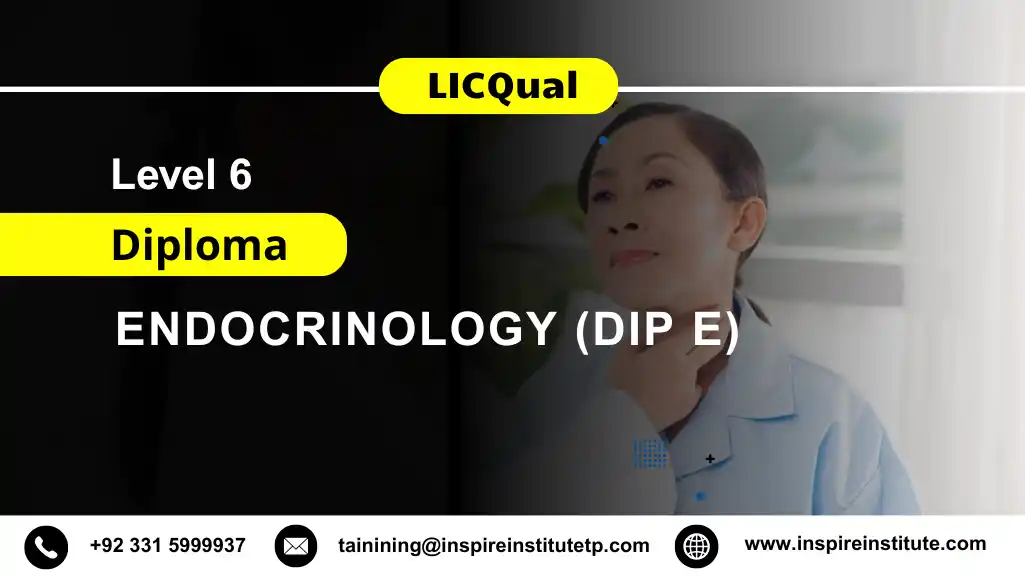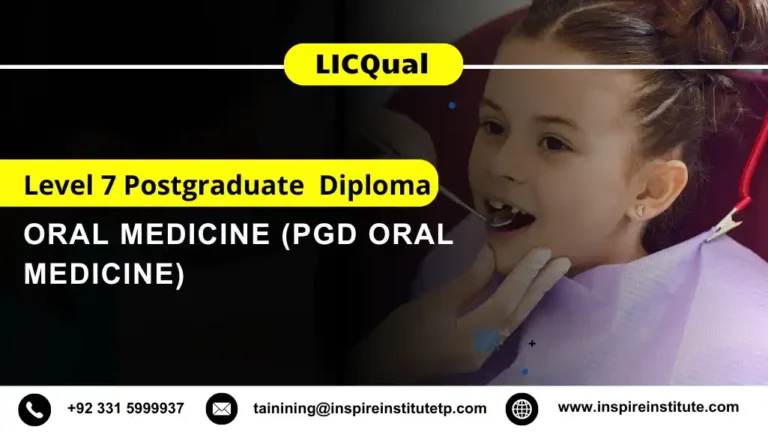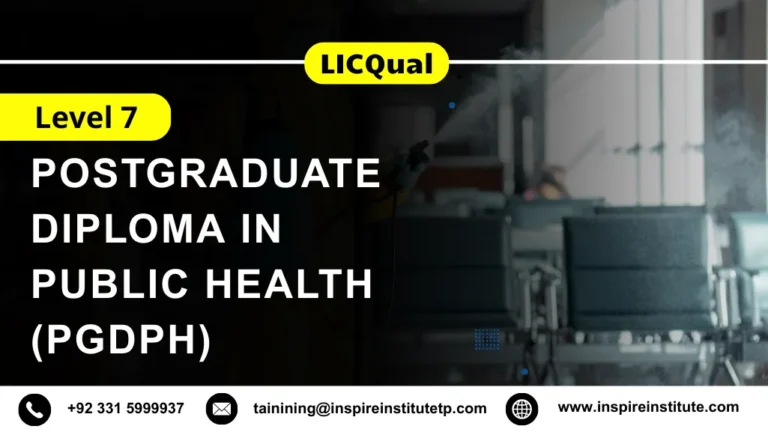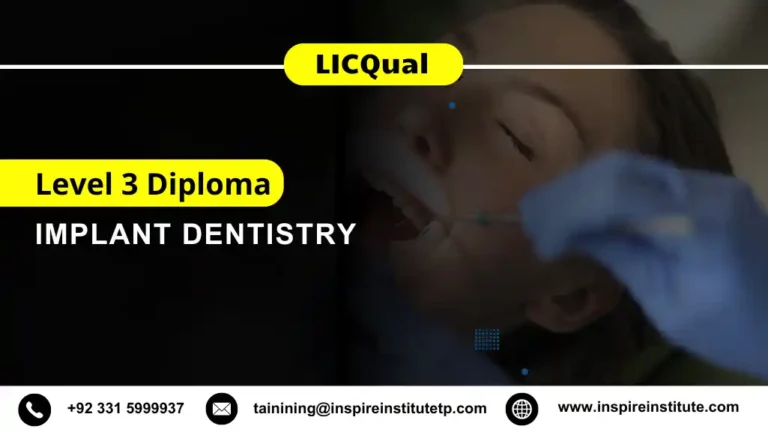LICQual Level 6 Diploma in Endocrinology (Dip E)
The LICQual Level 6 Diploma in Endocrinology (Dip E) is a UK-accredited qualification designed for healthcare professionals, clinicians, and aspiring medical specialists who seek to advance their expertise in the study, diagnosis, and management of endocrine disorders. Endocrinology plays a critical role in modern healthcare, addressing conditions related to hormones, metabolic disorders, thyroid diseases, diabetes, adrenal and pituitary dysfunctions, and reproductive health. This comprehensive, assignment-based diploma equips learners with both theoretical knowledge and practical skills essential for excellence in endocrine care.
The primary purpose of this course is to provide a structured pathway for healthcare professionals to enhance clinical competence in endocrinology. Learners will gain a deep understanding of endocrine system physiology, pathological mechanisms, and advanced diagnostic approaches. The curriculum integrates evidence-based practices and the latest clinical research to ensure learners can apply cutting-edge strategies in real-world patient care settings.
The LICQual Level 6 Diploma in Endocrinology also enhances career development opportunities. Graduates are well-positioned for roles such as Endocrinology Specialist, Clinical Endocrinologist, Research Coordinator, or Academic Lecturer. The internationally recognised UK-accredited qualification validates professional expertise, enabling learners to meet global standards and expand career prospects in hospitals, research institutions, and specialist endocrine clinics.
Why Choose this Qualification
The LICQual Level 6 Diploma in Endocrinology (Dip E) is designed for healthcare professionals seeking to advance their expertise in endocrine disorders, hormone therapy, and metabolic health. This UK-accredited qualification provides a structured pathway to enhance clinical competence, practical skills, and theoretical knowledge in endocrinology. It prepares learners to address complex endocrine conditions, deliver patient-centred care, and meet global healthcare standards.
Key Reasons to Choose this Qualification
Specialist Knowledge
- Gain comprehensive understanding of endocrine physiology, hormonal regulation, and pathophysiology.
- Learn to diagnose and manage complex endocrine disorders including diabetes, thyroid, adrenal, and pituitary conditions.
- Explore advanced treatment strategies and hormone therapies.
- Develop insight into endocrine system research and emerging clinical practices.
- Understand interdisciplinary approaches in endocrine patient care.
Practical Application
- Apply theoretical knowledge through case studies and clinical simulations.
- Develop skills in patient assessment, diagnostic testing, and endocrine management plans.
- Gain experience in interpreting laboratory results and imaging relevant to endocrine disorders.
- Strengthen decision-making for complex patient care scenarios.
- Enhance competence in integrating evidence-based practices into clinical workflows.
Recognised Qualification
- Achieve a UK-accredited, internationally recognised diploma in endocrinology.
- Validate professional expertise and clinical competence to meet global healthcare standards.
- Enhance credibility among employers and peers in healthcare and academic settings.
- Open career opportunities in hospitals, clinics, research institutions, and academia.
- Provide a solid foundation for further postgraduate studies or specialised training.
Flexible Learning Pathway
- Study at your own pace without disrupting professional commitments.
- Access online learning materials, structured guidance, and personalised mentorship.
- Integrate learning seamlessly with career responsibilities.
- Benefit from a self-directed, assignment-based programme structure.
- Manage workload efficiently while maintaining academic excellence.
Evidence-Based Training
- Engage with current research, clinical guidelines, and global best practices.
- Learn to critically evaluate scientific literature and studies in endocrinology.
- Apply validated clinical strategies for diagnosis and treatment.
- Improve patient outcomes through evidence-informed care plans.
- Stay updated on innovative therapies and endocrine management techniques.
Career Development
- Expand professional prospects in hospitals, specialist clinics, and research centres.
- Prepare for roles such as Endocrinology Specialist, Clinical Endocrinologist, or Research Coordinator.
- Develop leadership, clinical reasoning, and patient-management skills.
- Enhance employability with a globally recognised UK qualification.
- Build a pathway for academic or professional progression.
Enhanced Patient Impact
- Deliver patient-centred, ethical, and culturally sensitive endocrine care.
- Improve patient outcomes through accurate diagnosis and effective treatment.
- Apply advanced knowledge to support patients with chronic or complex endocrine disorders.
- Promote holistic care addressing physical, emotional, and psychological aspects.
- Contribute to sustainable healthcare practices and improved quality of life.
Professional Growth
- Strengthen critical thinking, leadership, and communication skills.
- Enhance interdisciplinary collaboration and reflective practice.
- Develop confidence in managing complex endocrine cases.
- Build expertise for strategic decision-making in healthcare settings.
- Position yourself as a competent professional capable of advancing endocrinology standards globally.
This diploma equips healthcare professionals with advanced knowledge, practical expertise, and internationally recognised credentials. By completing the LICQual Level 6 Diploma in Endocrinology (Dip E), learners gain the skills, confidence, and professional recognition needed to excel in the field of endocrinology while positively impacting patient care worldwide.e, and healthcare excellence globally.
Course Overview
LICQual UK Awarding Body
Average Completion Time:
6-24 Months
Study Units: 6 Units
Evidence & Assignment Based
Mandatory Units
Who Should Take This Course
The LICQual Level 6 Diploma in Endocrinology (Dip E) is specifically designed for healthcare professionals seeking to deepen their expertise in endocrine disorders, hormone therapies, and metabolic health management. This diploma is ideal for practitioners who want to enhance clinical knowledge, develop advanced practical skills, and make evidence-based decisions in endocrinology. It caters to both experienced clinicians and motivated healthcare workers aiming to advance their careers in specialised endocrine care.
This course is suitable for
Medical Professionals
- Physicians and general practitioners who want to specialise in endocrinology.
- Healthcare professionals managing patients with chronic endocrine disorders.
- Clinicians seeking advanced understanding of hormone therapies and metabolic diseases.
- Practitioners aiming to enhance diagnostic and treatment planning skills.
- Medical staff pursuing evidence-based approaches in endocrine care.
Nurses and Allied Health Professionals
- Registered nurses managing endocrine or metabolic patients.
- Healthcare practitioners supporting endocrinology teams in hospitals or clinics.
- Nurses seeking advanced knowledge in hormone regulation, patient monitoring, and treatment.
- Allied health staff involved in chronic disease management and patient education.
- Professionals aiming to expand their roles in specialised endocrine care.
Clinical Researchers
- Researchers studying endocrine disorders, hormone therapies, or metabolic health.
- Professionals aiming to implement evidence-based research in clinical settings.
- Scientists seeking structured knowledge to inform endocrine clinical trials.
- Healthcare analysts looking to contribute to improved endocrine treatment protocols.
- Research coordinators pursuing recognised qualifications in endocrinology.
Medical Educators and Trainers
- Academic instructors teaching endocrinology or metabolic health courses.
- Educators seeking structured curriculum knowledge to mentor healthcare staff.
- Trainers wanting to integrate advanced endocrine practices into teaching modules.
- Professionals aiming to develop educational resources in specialised endocrine care.
- Clinicians planning to provide training in patient-centred endocrine management.
Hospital and Clinic Staff
- Endocrine clinic staff aiming to improve patient care standards.
- Professionals involved in multidisciplinary teams managing metabolic and hormonal disorders.
- Staff needing enhanced diagnostic, treatment, and monitoring skills.
- Hospital personnel pursuing recognised qualifications to advance their career paths.
- Healthcare coordinators implementing evidence-based endocrine protocols.
International Healthcare Professionals
- Professionals with international medical or allied health qualifications.
- Practitioners seeking UK-accredited certification to validate their expertise globally.
- Healthcare workers aiming to standardise endocrine practices across regions.
- International staff integrating advanced endocrine care principles in their practice.
- Clinicians preparing for global career opportunities in endocrinology.
Aspiring Specialists
- Healthcare professionals aiming to become endocrine specialists or consultants.
- Practitioners seeking promotion or advanced clinical roles in hospitals or research centres.
- Professionals preparing for postgraduate studies in endocrinology or metabolic medicine.
- Clinicians looking to strengthen critical thinking and clinical reasoning in endocrine care.
- Staff aiming to deliver high-quality, patient-centred endocrine services.
Professionals in Health Policy and Administration
- Medical managers and administrators overseeing endocrine services or programs.
- Policy makers aiming to understand clinical endocrine management to improve guidelines.
- Professionals developing healthcare protocols for metabolic and hormonal conditions.
- Leaders integrating evidence-based endocrine practices into institutional strategies.
- Healthcare coordinators implementing quality improvement initiatives in endocrine care.
This diploma ensures that learners from diverse healthcare backgrounds acquire advanced knowledge, practical skills, and professional credibility in endocrinology. By completing the LICQual Level 6 Diploma in Endocrinology (Dip E), professionals are equipped to enhance patient outcomes, drive evidence-based practices, and advance their careers in specialised endocrine healthcare globally.
Course Benefits
The LICQual Level 6 Diploma in Endocrinology (Dip E) is a UK-accredited qualification designed for healthcare professionals, endocrinology practitioners, and aspiring medical leaders who aim to advance their expertise in diagnosing, managing, and treating endocrine and metabolic disorders. This comprehensive, assignment-based Diploma in Endocrinology integrates theoretical knowledge with practical applications, enabling learners to develop, implement, and evaluate effective endocrine care strategies. Through evidence-based learning and flexible study pathways, this qualification prepares professionals to deliver high-quality endocrine services, improve patient outcomes, and contribute to advancements in clinical endocrinology practice.
Key Benefits of the Course
- Specialist Knowledge:
Gain advanced understanding of endocrine anatomy, physiology, and pathology. Learners explore critical areas such as thyroid, adrenal, pituitary, pancreatic, and gonadal disorders. The course also covers advanced diagnostics, hormone replacement therapies, and pharmacological management, equipping learners with the knowledge to manage complex endocrine cases confidently. - Practical Application:
Develop hands-on skills through case studies, clinical simulations, and research-based assignments. Learners enhance their ability to assess, diagnose, and treat endocrine disorders effectively. The program trains professionals to implement evidence-based treatment plans, monitor patient outcomes, and collaborate with multidisciplinary teams to deliver comprehensive endocrine care. - Recognised Qualification:
Earn a prestigious UK-accredited Diploma in Endocrinology (Dip E) that validates clinical expertise and professional competence. This internationally recognised qualification ensures learners meet global standards, enhancing credibility and opening career opportunities in hospitals, specialised endocrine clinics, academic institutions, and healthcare organisations worldwide. - Flexible Learning Pathway:
Designed for working medical professionals, the assignment-based structure allows learners to study without disrupting their careers. Learners can progress at their own pace, accessing digital resources, structured guidance, and personalised mentorship, providing a seamless balance between education and professional responsibilities. - Evidence-Based Training:
Engage with the latest research, clinical guidelines, and innovative endocrine practices. The course emphasizes applying evidence-based strategies in diagnostics, hormone therapy, and metabolic management. Learners gain the skills to critically evaluate scientific literature and implement validated practices that improve patient care and outcomes. - Career Development:
This qualification expands career prospects across hospitals, endocrine centres, research organisations, and academic institutions. Graduates may pursue roles such as Endocrinology Specialist, Clinical Endocrinologist, Research Coordinator, or Academic Lecturer. It also provides a foundation for advanced postgraduate studies or specialised endocrine training. - Enhanced Patient Impact:
Learn to deliver safe, ethical, and patient-centred endocrine care. The Diploma in Endocrinology builds competence in addressing metabolic and hormonal disorders, improving patient quality of life, and implementing sustainable, culturally sensitive treatment approaches. Graduates are equipped to make a meaningful impact in diverse healthcare settings. - Professional Growth:
Strengthen critical thinking, clinical reasoning, leadership, and communication skills essential for endocrinology practice. The Diploma encourages reflective learning, interdisciplinary collaboration, and strategic decision-making. Graduates emerge as competent, confident professionals capable of advancing standards in endocrine medicine globally.
The LICQual Level 6 Diploma in Endocrinology (Dip E) empowers healthcare professionals to become leaders in endocrinology through advanced knowledge, practical expertise, and globally recognised credentials. It enhances career prospects while contributing significantly to improved patient care and endocrine health outcomes worldwide.
Eligibility Criteria
The LICQual Level 6 Diploma in Endocrinology (Dip E) is a UK-accredited qualification designed for healthcare professionals, endocrinology practitioners, and aspiring medical leaders who wish to enhance their expertise in diagnosing, managing, and treating endocrine and metabolic disorders. This assignment-based diploma combines theoretical knowledge with practical applications, enabling learners to assess, plan, implement, and evaluate endocrine care programs effectively.
Educational Background:
Applicants should hold a recognised qualification in medicine, nursing, healthcare, or a related endocrinology or clinical field. A Level 5 diploma or equivalent qualification in healthcare management, clinical sciences, or related disciplines may also be accepted. Candidates with international degrees in medicine, endocrinology, or allied health disciplines will be evaluated individually to determine eligibility and equivalence to UK standards.
Professional Experience:
A minimum of one year of experience in healthcare, clinical practice, endocrinology, or a related medical field is recommended. Previous exposure to patient care, hormone therapy, or clinical assessment provides an advantage. Motivated applicants with a strong interest in endocrine disorders, metabolic management, or patient care, even without direct professional experience, are encouraged to apply.
Age Requirement:
Applicants must be at least 18 years old at the time of enrolment. This ensures learners possess the maturity, ethical understanding, and professional responsibility required for advanced study and practical application in endocrinology.
Language Proficiency:
As the programme is delivered entirely in English, learners must demonstrate proficiency in reading, writing, and communication. A minimum IELTS score of 6.0 or an equivalent qualification is recommended for non-native English speakers to ensure effective participation in assignments, discussions, and assessments.
Technical Requirements:
Learners should have access to a computer or laptop with a reliable internet connection to participate in online learning, access study materials, and submit assignments. Basic computer literacy, including proficiency in research, data analysis, document preparation, and communication tools, is essential for academic success in this programme.
Required Documents:
Applicants are required to submit the following documents during registration:
A valid ID card or passport for identity verification.
Academic transcripts or certificates of previous qualifications.
The Qualification Process
LICQual Level 6 Diploma in Endocrinology (Dip E) follows a structured pathway to ensure learners gain comprehensive knowledge, practical skills, and professional competence in community oral healthcare.
Step 1: Self-Assessment
Learners review the entry requirements to confirm eligibility. Candidates with a background in dentistry, oral health, or public health are encouraged to apply.
Step 2: Registration
Complete the registration process by submitting required documents such as proof of qualifications, a valid ID, and payment of enrollment fees.
Step 3: Induction
An induction session is conducted to:
- Verify learner eligibility and documentation.
- Introduce study materials, learning outcomes, and assessment procedures.
Step 4: Learning and Evidence Submission
Learners complete assignments, case studies, and practical exercises demonstrating competence in public health dentistry, community oral health assessment, preventive strategies, and program planning.
Step 5: Feedback and Revision
Assessors review submitted evidence and provide constructive feedback. Learners can revise and resubmit work to meet all required standards.
Step 6: Competence Validation
Final submissions are evaluated to confirm that learners have met all theoretical and practical learning outcomes.
Step 7: Internal Quality Assurance (IQA)
The IQA team reviews the assessment process to ensure accuracy, fairness, and compliance with international standards.
Step 8: External Verification (EQA)
External verifiers validate the authenticity and quality of learner achievements.
Step 9: Certification
Upon successful verification, learners are awarded LICQual Level 6 Diploma in Endocrinology (Dip E) , demonstrating advanced proficiency in community oral healthcare and preparing them for professional growth in dental public health, preventive dentistry, and healthcare policy.







